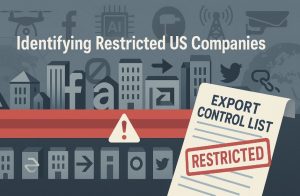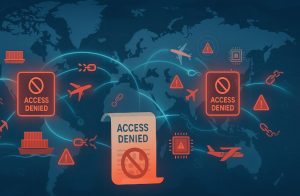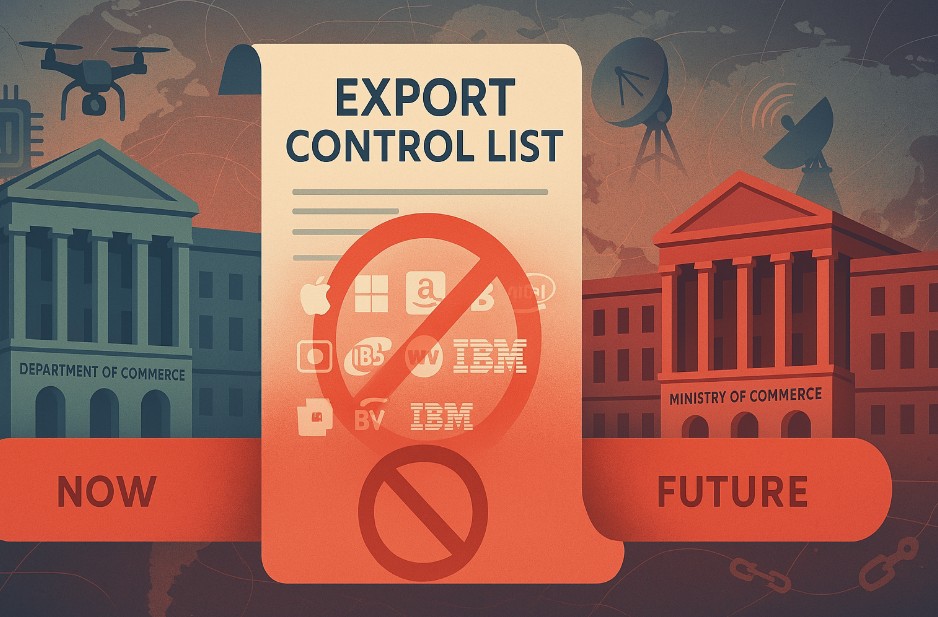12 American Companies to an Export Control List
Did you know that countries use export control lists as a strategic tool to safeguard national interests? These lists regulate the transfer of specific goods, technologies, and services to prevent them from being used in ways that could harm national security or violate international obligations.
In the United States, the Bureau of Industry and Security (BIS) part of the Department of Commerce manages these lists. The goal is to restrict access to sensitive American technologies, especially in high-stakes areas like defence, AI, and aerospace.
However, this isn’t a one-sided move. In a significant retaliatory action, China’s Ministry of Commerce (MOFCOM) has also announced the inclusion of 12 American companies to an export control list, citing concerns for national security and compliance with non-proliferation obligations.
What Role Does the US Department of Commerce Play in Trade Restrictions?
The US Department of Commerce, through the BIS, holds the authority to restrict technology exports and add companies to the Entity List.
These decisions are often based on concerns that certain entities could misuse American technologies, especially those with dual-use or military applications.
But the US is not alone in exercising this authority. As of 12:01 p.m. on 10 April, China officially added 12 US entities to its own export control list, prohibiting the export of dual-use items to them.
According to MOFCOM, these companies were found to be engaged in activities that may endanger China’s national security and interests.
This reciprocal action reflects a broader geopolitical strategy, where both countries are utilising trade controls as instruments of foreign policy and defence.
Who Are the 12 American Companies Added to the Export Control List?

The list of newly sanctioned US firms includes a mix of defence contractors, aerospace developers, and technology firms.
Chinese Ministry of Commerce – Sanctioned US Firms:
| Company Name | Sector | Alleged Activity |
| American Photonics | Optics & Defence | Technology linked to military use |
| Novotech, Inc. | Research & Development | Suspected tech cooperation harmful to China |
| Echodyne | Radar Systems | Dual-use technology exports |
| Marvin Engineering Company, Inc. | Defence Systems | Export of controlled components |
| Exovera | Data Analytics | Strategic technology activities |
| Teledyne Brown Engineering, Inc. | Aerospace | Cooperation with restricted regions |
| BRINC Drones, Inc. | Drones & Surveillance | Military technology export |
| SYNEXXUS, Inc. | Tactical Communications | National security risk |
| Firestorm Labs, Inc. | AI & Automation | Suspected military collaborations |
| Kratos Unmanned Aerial Systems | Defence & Aerospace | Export violations involving unmanned systems |
| Domo Tactical Communications | Tactical Systems | Technology exports of concern |
| Insitu, Inc. | Unmanned Aerial Vehicles | Military cooperation with Taiwan |
China stated that ongoing exports to these companies must cease immediately, and any potential exports in exceptional cases will require government approval.
Which Technologies Are Being Targeted by These Restrictions?
Both nations are focusing on dual-use technologies innovations that can serve both civilian and military purposes. The items now restricted in trade often involve advanced components and systems, such as:
- Unmanned Aerial Systems (UAS)
- AI-based decision systems
- Radar and surveillance hardware
- Quantum and photonic technologies
- Defence-grade communications equipment
These technologies play a vital role in modern warfare and intelligence operations, and the risks associated with their transfer are now seen as too great to ignore.
How Will These Export Controls Affect Global Trade?

This latest wave of export restrictions underscores a widening rift between two of the world’s largest economies. The mutual blacklisting of companies is intensifying concerns over supply chain instability and global trade disruption.
Notable consequences include:
- Disrupted tech collaborations between Western and Chinese firms
- Increased compliance costs for multinationals navigating dual regulations
- Escalation of US-China trade tensions, especially over Taiwan and military tech
China’s decision to penalise companies allegedly involved in arms sales to Taiwan adds an overt political dimension to the trade conflict, indicating the measures are as much geopolitical as they are regulatory.
What Do These Sanctions Mean for UK and European Businesses?
Businesses in the UK and across Europe now face a more complex landscape when engaging with US or Chinese firms involved in restricted industries.
Even indirect exposure to blacklisted companies through supply chains or joint ventures could trigger compliance issues.
Key risks include:
- Inadvertent violation of foreign trade laws
- Loss of access to critical US or Chinese technologies
- Heightened scrutiny from regulatory bodies and customs enforcement
MOFCOM’s announcement made it clear that export operators must strictly comply with these new regulations and that violations will be met with penalties.
However, Chinese officials were also keen to stress that these measures are targeted only at a small group of offending firms and that law-abiding foreign businesses remain welcome in China.
What Could Happen Next for the Companies on the List?
Both China and the United States provide mechanisms for appeal, though they are rarely quick or transparent. For the 12 American firms targeted by China, this blacklisting could lead to:
- Loss of access to Chinese markets and supply chains
- Reputational damage within the international business community
- Delays in project execution and investment from global partners
Similarly, Chinese companies sanctioned by the US often struggle to regain access to critical components like semiconductors, cloud infrastructure, or Western software tools.
Expect more companies especially those in defence, aerospace, and AI to be placed under scrutiny as both nations tighten their export compliance regimes.
Are These Export Controls a Sign of Broader Restrictions to Come?

Absolutely. The latest moves by both China and the US indicate a deepening policy shift, one where technology and trade are viewed through the lens of national security, not just economic growth.
With rising tensions over Taiwan, military tech exports, and cybersecurity, the world is seeing a new era of geopolitical competition in innovation.
Export control regimes are expected to become more aggressive, comprehensive, and retaliatory in the years ahead.
Companies across the globe must now stay ahead of evolving regulations to protect their investments and ensure continued compliance.
FAQs
How does a company end up on the US or China export control list?
Companies may be added for participating in activities that threaten national security, such as selling sensitive technologies or cooperating with military entities.
What does it mean for companies added to China’s export control list?
They are prohibited from receiving Chinese-origin dual-use goods, and all ongoing related export activities must stop immediately.
Can businesses continue exports under any exceptions?
Yes, but they must apply for special approval. This is rare and granted only in exceptional cases.
How are UK businesses affected by these developments?
They may face compliance issues if they work with or source from restricted entities in the US or China, potentially risking penalties or trade delays.
Which companies were named in China’s recent export control list update?
Firms include American Photonics, Novotech, Echodyne, and BRINC Drones, among others, all linked to dual-use technologies and alleged military cooperation.
Why is Taiwan mentioned in these export restrictions?
Some US firms were penalised for arms sales or military tech cooperation with Taiwan, which China considers a breach of its sovereignty.
Is the business environment in China still open to foreign companies?
Yes, according to MOFCOM, China continues to welcome law-abiding foreign enterprises and remains committed to a fair and stable investment climate.







